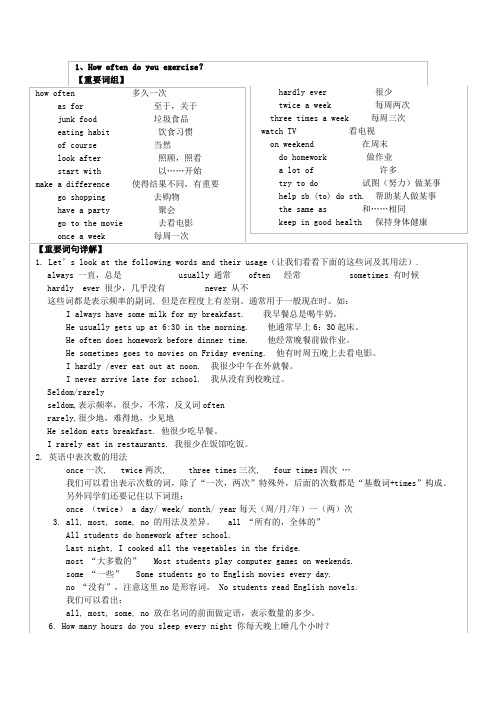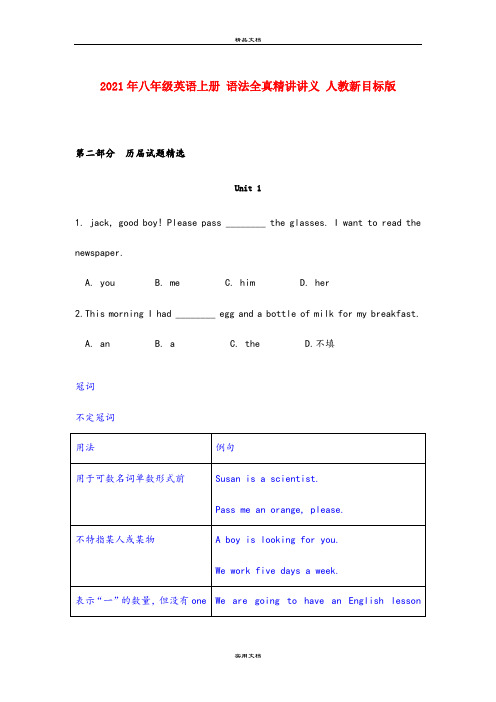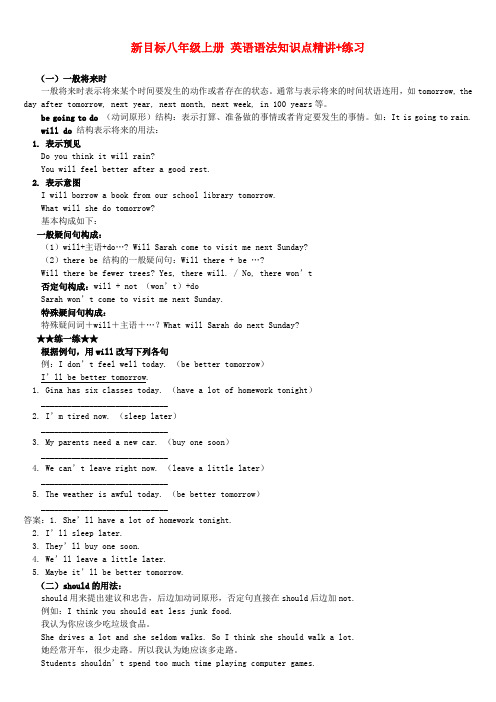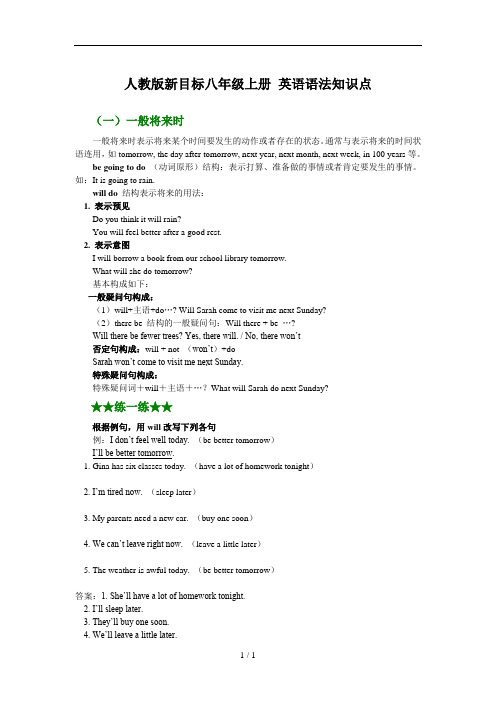八年级英语上册 语法全真精讲讲义 人教新目标版
人教版新目标八年级上册 英语语法知识点

人教版新目标八年级上册英语语法知识点(一)一般将来时一般将来时表示将来某个时间要发生的动作或者存在的状态。
通常与表示将来的时间状语连用;如tomorrow;the day after tomorrow;next year;next month;next week;in 100 years等。
be going to do(动词原形)结构:表示打算、准备做的事情或者肯定要发生的事情。
如:It is going to rain.will do结构表示将来的用法:1. 表示预见Do you think it will rain?You will feel better after a good rest.2. 表示意图I will borrow a book from our school library tomorrow.What will she do tomorrow?基本构成如下:一般疑问句构成:(1)will+主语+do…xt Sunday?(2)there be 结构的一般疑问句:Will there + be …?Will there be fewer trees? Yes;there will. / No;there won’t否定句构成:will + not (won’t)+doSarah won’特殊疑问句构成:特殊疑问词+will+主语+…?What will Sarah do next Sunday?★★练一练★★根据例句;用will改写下列各句例:I don’t feel well tod ay. (be better tomorrow)I’ll be better tomorrow.1. Gina has six classes today. (have a lot of homework tonight)_____________________________2. I’m tired now. (sleep later)_____________________________3. My parents need a new car. (buy one soon)_____________________________4. We can’t leave right now. (leave a little later)_____________________________5. The weather is awful today. (be better tomorrow)_____________________________答案:1. She’ll have a lot of homew ork tonight.2. I’ll sleep later.3. They’ll buy one soon.4. We’ll leave a little later.5. Maybe it’ll be better tomorrow.(二)should的用法:should用来提出建议和忠告;后边加动词原形;否定句直接在should后边加not.例如:I think you should eat less junk food.我认为你应该少吃垃圾食品。
人教版新目标八年级英语上册单元知识详解全册

Detailed Solution for Unit 2 What’s the matter.【重要词组】◆ have a cold 患感冒◆ stressed out 紧张的,有压力的◆ bean sprout 豆芽◆ get tired 感觉疲惫◆ stay healthy 保持健康◆ at the moment 此刻,现在◆ get/ have a cold 患感冒◆ see a doctor /dentist 看医生/牙医◆ go to the party 去参加聚会◆ make sb sick 使某人不舒服(患锁病)◆ have a sore throat 嗓子痛◆ have a fever 发烧,发热◆ have a toothache 牙痛◆ have a backache 背痛◆lie down and rest 躺下休息◆drink lots of water 喝大量水◆drink hot tea with honey 喝热蜂蜜茶◆ have a headache 头痛◆ get tired 累了医院名称:children’s hospital 儿童医院clinic 诊疗所first - aid station 急救站ward 病房medical department 内科surgical department 外科registration office 挂号处out - patient department(OPD) 门诊部in - patient department 住院部nursing department 护理部waiting room 候诊室emergency room 急诊室operation room 手术室laboratory 化验室blood bank 血库pharmacy , dispensary 药房表示感觉的形容词有:tired 累的thirsty口渴的hungry饿的stressed out紧张的,有压力的【重要词句详解】1. How to talk about our health①问某人哪儿不舒服:When we are not feeling well , we often go to see the doctor . The doctor will ask :What’s wrong (with you)What’s the matter (with you) What’s your trouble What happens to youIs there anything wrong with you都表示“你怎么了”。
人教版新目标八年级上册英语语法知识点

人教版新目标八年级上册英语语法知识点(一)一般将来时一般将来时表示将来某个时间要发生的动作或者存在的状态。
通常与表示将来的时间状语连用,如tomorrow, the day after tomorrow, next year, next month, next week, in 100 years等。
be going to do(动词原形)结构:表示打算、准备做的事情或者肯定要发生的事情。
如:It is going to rain.will do结构表示将来的用法:1. 表示预见Do you think it will rain?You will feel better after a good rest.2. 表示意图I will borrow a book from our school library tomorrow.What will she do tomorrow?基本构成如下:一般疑问句构成:(1)will+主语+do…? Will Sarah come to visit me next Sunday?(2)there be 结构的一般疑问句:Will there + be …?Will there be fewer trees? Yes, there will. / No, there won’t否定句构成:will + not (won’t)+doSarah won’t come to visit me next Sunday.特殊疑问句构成:特殊疑问词+will+主语+…?What will Sarah do next Sunday?★★练一练★★根据例句,用will改写下列各句例:I don’t feel well today. (be better tomorrow)I’ll be better tomorrow.1. Gina has six classes today. (have a lot of homework tonight)_____________________________2. I’m tired now. (sleep later)_____________________________3. My parents need a new car. (buy one soon)_____________________________4. We can’t leave right now. (leave a little later)_____________________________5. The weather is awful today. (be better tomorrow)_____________________________答案:1. She’ll have a lot of homework tonight.2. I’ll sleep later.3. They’ll buy one soon.4. We’ll leave a little later.5. Maybe it’ll be better tomorrow.(二)should的用法:should用来提出建议和忠告,后边加动词原形,否定句直接在should后边加not.例如:I think you should eat less junk food.我认为你应该少吃垃圾食品。
八年级英语上册 语法详解 人教新目标版

1) leave的用法1.“leave+地点”表示“离开某地”。
例如:When did you leave Shanghai?你什么时候离开上海的?2.“leave for+地点”表示“动身去某地”。
例如:Next Friday, Alice is leaving for London.下周五,爱丽斯要去伦敦了。
3.“leave+地点+for+地点”表示“离开某地去某地”。
例如:Why are you leaving Shanghai for Beijing?你为什么要离开上海去北京?2) 情态动词should“应该”学会使用should作为情态动词用,常常表示意外、惊奇、不能理解等,有“竟会”的意思,例如:How should I know? 我怎么知道?Why should you be so late today? 你今天为什么来得这么晚?should有时表示应当做或发生的事,例如:We should help each other.我们应当互相帮助。
我们在使用时要注意以下几点:1. 用于表示“应该”或“不应该”的概念。
此时常指长辈教导或责备晚辈。
例如:You should be here with clean hands. 你应该把手洗干净了再来。
2. 用于提出意见劝导别人。
例如:You should go to the doctor if you feel ill. 如果你感觉不舒服,你最好去看医生。
3. 用于表示可能性。
should的这一用法是考试中常常出现的考点之一。
例如:We should arrive by supper time. 我们在晚饭前就能到了。
She should be here any moment. 她随时都可能来。
3) What...? 与 Which...?1. what 与 which 都是疑问代词,都可以指人或事物,但是what仅用来询问职业。
如:What is your father? 你父亲是干什么的?该句相当于:What does your father do?What is your father's job?Which 指代的是特定范围内的某一个人。
精心整理人教版新目标八年级上册英语知识点全册知识讲解

精心整理人教版新目标八年级上册英语知识点全册人教版八年级上册英语知识点Unit 1 Where did you go on vacation?(谈论假期生活,一般过去时)Unit 2 How often do you exercise?(谈论生活习惯,一般现在时)Unit 3 I'm more outgoing than my sister(谈论事物对比,形容词比较级)Unit 4 What's the best movie theater?(谈论事物比较,形容词最高级)Unit5 Do you want to watch a game show?(谈论内心想法,一般现在时)Unit6 I’m going to study computer science.(谈谈生活的目标,一般将来时)Unit7 Will people have robots?(对将来生活的预言,一般将来时)Unit8 How do you make a banana milk shake?(描述进程,祈使句)Unit9 Can you come to my party?(学习邀请,作出、接受和拒绝邀请,学习表请求的句子) Unit10 If you go to the party, you’ll have a great time.(作出决定,学习if的条件状语从句)①复习一般过去时②复合不定代词的用法③反身代词的用法④系动词的用法⑤动词后的to do和doing 的区别⑥ed形容词和ing形容词的区别⑦“近义词”的区别⑧本单元中的主谓一致现象⑨动词过去式的构成及不规则动词表⑩用同义短语转换同义句时谓语动词形式一致性的培养。
⑾感叹句的结构和连词的选择。
Unit1 Where did you go on vacation?单词anyone ['eniwʌn] pron.任何人anywhere ['eniweə(r)] adv.任何地方 n.任何(一个)地方wonderful ['wʌndəfl] adj.精彩的;极好的few [fjuː] adj.很少的;n.少量most [məʊst] adj.最多的;大多数的;something ['sʌmθɪŋ] pron.某事物;nothing (=not…anything) ['nʌθɪŋ] pron.没有什么n.没有myself [maɪ'self] pron.我自己everyone ['evriwʌn] pron.每人;人人yourself [jɔː'self] pron.你自己;你亲自hen [hen] n.母鸡;雌禽bored [bɔːd] adj.无聊的;厌烦的;郁闷的pig n.猪diary ['daɪəri] n.日记;日记簿(keep a diary)seem [siːm] vi.似乎;好像someone ['sʌmwʌn] pron.某人;有人quite a few相当多;不少(后接可数名词)of course [əvkɔːs] 当然activity [æk'tɪvəti] n.活动;活跃decide [dɪ'saɪd] v.决定;选定(decide to do sth.)try [traɪ] v.尝试;设法;努力 (try to do sth. /try doing sth.) bird [bɜːd] n.鸟;禽paragliding ['pærəɡlaɪdɪŋ] n.空中滑翔跳伞bicycle ['baɪsɪkl] n.自行车building ['bɪldɪŋ] n.建筑物trader ['treɪdə(r)] n.商人;商船wonder ['wʌndə(r)] v.惊奇;想知道;怀疑difference ['dɪfrəns] n.差异;不同top [tɒp] n.顶部;顶wait [weɪt] v.等;等待(wait for)umbrella [ʌm'brelə] n.伞;雨伞wet [wet] adj.湿的;雨天的below [bɪ'ləʊ] prep.低于;在...下面adv.在下面as [əz] conj.如同;像...一样enough [ɪ'nʌf] adj.足够的adv.足够地;充分地duck [dʌk] n.鸭肉;鸭hungry(反full) ['hʌŋɡri] adj.饥饿的;渴望的feel like(doing sth.)想要dislike [dɪs'laɪk] v.不喜欢;厌恶 n.不喜爱;厌恶;反感重点短语1. go on vacation去度假2.stay at home 待在家里3.go to the mountains 去爬山4. go to the beach 去海滩5. visit museums 参观博物馆6. go to summer camp 去参加夏令营7.quite a few 相当多8.study for 为……而学习9.go out 出去10.most of the time 大部分时间11. taste good 尝起来很好吃12.have a good time 玩得高兴13. of course 当然14.feel like 给……的感觉;感受到15.go shopping 去购物16.in the past 在过去17. walk around 四处走走18. because of 因为19. one bowl of… 一碗……20. the next day 第二天21. drink tea 喝茶22. find out 找出;查明23. go on 继续24.take photos 照相25. something important 重要的事26. up and down 上上下下27. come up 出来28. buy sth. for sb. / buy sb. sth. 为某人买某物29. taste + adj. 尝起来……30. look+adj. 看起来……31.nothing…but+动词原形除了……之外什么都没有32.seem+(to be)+ adj. 看起来……33. arrive in+大地点 / arrive at+小地点到达某地34.decide to do sth. 决定去做某事35. try doing sth. 尝试做某事 /36. try to do sth. 尽力去做某事37. forget doing sth. 忘记做过某事/38. forget to do sth. 忘记做某事39. enjoy doing sth. 喜欢做某事40. want to do sth. 想去做某事41. start doing sth. 开始做某事42. stop doing sth. 停止做某事43. dislike doing sth.不喜欢做某事44. keep doing sth. 继续做某事45. Why not do. sth.? 为什么不做……呢?46. so+adj.+that+从句如此……以至于……47. tell sb. (not) to do sth. 告诉某人(不要)做某事48 .have a good time=enjoy oneself=have fun(doing sth.)玩得痛快三、重点句子:1. Where did you go on vacation? 你去哪儿度假的?2. Long time no see. 好久不见。
人教版新目标八年级上册英语知识点全册说课讲解

人教版新目标八年级上册英语知识点全册最新(2013秋)人教版八年级上册英语知识点Unit 1 Where did you go on vacation?(谈论假期生活,一般过去时)Unit 2 How often do you exercise?(谈论生活习惯,一般现在时)Unit 3 I'm more outgoing than my sister(谈论事物对比,形容词比较级)Unit 4 What's the best movie theater?(谈论事物比较,形容词最高级)Unit5 Do you want to watch a game show?(谈论内心想法,一般现在时)Unit6 I’m going to study computer science.(谈谈生活的目标,一般将来时)Unit7 Will people have robots?(对将来生活的预言,一般将来时)Unit8 How do you make a banana milk shake?(描述进程,祈使句)Unit9 Can you come to my party?(学习邀请,作出、接受和拒绝邀请,学习表请求的句子)Unit10 If you go to the party, you’ll have a great time.(作出决定,学习if的条件状语从句)①复习一般过去时②复合不定代词的用法③反身代词的用法④系动词的用法⑤动词后的to do和doing 的区别⑥ed形容词和ing形容词的区别⑦“近义词”的区别⑧本单元中的主谓一致现象⑨动词过去式的构成及不规则动词表⑩用同义短语转换同义句时谓语动词形式一致性的培养。
⑾感叹句的结构和连词的选择。
1. go on vacation去度假2.stay at home 待在家里3.go to the mountains 去爬山4. go to the beach 去海滩5. visit museums 参观博物馆6. go to summer camp 去参加夏令营7.quite a few 相当多8.study for 为……而学习9.go out 出去10.most of the time 大部分时间11. taste good 尝起来很好吃12.have a good time 玩得高兴13. of course 当然14.feel like 给……的感觉;感受到15.go shopping 去购物16.in the past 在过去17. walk around 四处走走18. because of 因为19. one bowl of… 一碗……20. the next day 第二天21. drink tea 喝茶22. find out 找出;查明23. go on 继续24.take photos 照相25. something important 重要的事26. up and down 上上下下27. come up 出来28. buy sth. for sb. / buy sb. sth. 为某人买某物29. taste + adj. 尝起来……30. look+adj. 看起来……31.nothing…but+动词原形除了……之外什么都没有32.seem+(to be)+ adj. 看起来……33. arrive in+大地点 / arrive at+小地点到达某地34.decide to do sth. 决定去做某事35. try doing sth. 尝试做某事 /36. try to do sth. 尽力去做某事37. forget doing sth. 忘记做过某事/38. forget to do sth. 忘记做某事39. enjoy doing sth. 喜欢做某事40. want to do sth. 想去做某事41. start doing sth. 开始做某事42. stop doing sth. 停止做某事43. dislike doing sth.不喜欢做某事44. keep doing sth. 继续做某事45. Why not do. sth.? 为什么不做……呢?46. so+adj.+that+从句如此……以至于……47. tell sb. (not) to do sth. 告诉某人(不要)做某事48 .have a good time=enjoy oneself=have fun(doing sth.)玩得痛快三、重点句子:1. Where did you go on vacation? 你去哪儿度假的?2. Long time no see. 好久不见。
人教新目标八年级上册英语课时知识内容精讲

课时内容精讲Unit1❶anyone的用法Did you go with anyone?你和某个人一起去的吗?(P2)1.anyone是指人的复合不定代词,在句中可作主语或宾语,一般用在否定句或疑问句中。
当它被形容词修饰时,形容词要位于其后。
2.someone也是由-one构成的复合不定代词,someone意为“某人;有人”,通常用在肯定句中。
例如:I don’t know how to solve the problem.You can ask someone else for help.我不知道怎样解决这个问题。
你可以向别人求助。
❷anywhere的用法Oh,did you go anywhere interesting?喔,你去了有趣的地方了吗?(P2)anywhere是由any和where构成的复合不定副词,通常用在否定句或疑问句中。
当形容词修饰anywhere时,形容词要位于其后。
由-where构成的不定副词somewhere 在某处anywhere 在任何地方nowhere 任何地方都不everywhere 到处;处处例如:I left my book somewhere near here.我把我的书落在附近某处了。
❸few的用法We took quite a few photos there.我们在那里拍了很多照片。
(P2)few作形容词时,用来修饰可数名词,此时few作定语;few作代词时,可以作主语或宾语。
辨析few,a few,little与a little词条意义用法few很少;几乎没有表示否定意义,修饰可数名词复数。
a few几个;一些表示肯定意义,修饰可数名词复数。
little很少;几乎没有表示否定意义,修饰不可数名词。
a little一点;一些表示肯定意义,修饰不可数名词。
例如:Tom has little money,but few students want to help him.汤姆几乎没有钱了,但是几乎没有学生想帮助他。
2021年八年级英语上册 语法全真精讲讲义 人教新目标版

2021年八年级英语上册语法全真精讲讲义人教新目标版第二部分历届试题精选Unit 11. jack, good boy! Please pass ________ the glasses. I want to read the newspaper.A. youB. meC. himD. her2.This morning I had ________ egg and a bottle of milk for my breakfast.A. anB. aC. theD.不填冠词不定冠词强烈tomorrow.I have a mouth, a nose, two eyes and two ears.用于固定词组中 A few, a little, a lot of, a moment ago定冠词用法例句特指某人或者某物Show me the photo of the boy.双方都知道的事物或人Where are the new books, Jim?They are on the small table.上文提过的人或物Ji Wei lives on a farm. The farm is not big.独一无二The sun is bigger than the moon.序数词和形容词最高级前The first month of the year is January.普通名词构成的专有名词前The Great Wall习惯用语In the morningOn the left用法例句专有名词和不可数名词前China名词已经有定语this, that, my,That letter is in her bag.your, some, any等复数名词表示一类人或物My father and mother are teachers.星期、月份、季节、节日前It is Sunday today.称呼前What colour are Mrs. Green’s shoes?三餐和球类运动前He went to school before breakfast this morning.3. —How many ________ can you see in the following pictures?—Three.A. boysB. animalsC. filmsD. buildings4. Timmy goes to school ________ every day. It's 5 minutes' walk from his home to school.A. in a busB. by planeC. on footD. by boat5. Everything is ________ at night markets. You don't need a lot of money to havea good time.A. cheapB. badC. tiredD. dear6. —Excuse me, ________ is the nearest bookshop?—Go down the street and turn left at the second corner.A. howB. whatC. whereD. who7. The sign tells us ________.A. NO SMOKINGB. NO PARKINGC. NO PHOTOSD. NO FOOD8. —Can you play football?—Yes, I can, ________ I can't play it very well.转折关系A. orB. andC. soD. but9. Last month, students had to have their lessons by internet ________ because of SARS.A. on the playgroundB. at homeC. in the streetD. near the hospital10. It is ________ today than yesterday. Shall we go swimming this afternoon?A .the hottest B. hotC. hottestD. hotter最高级要加the,由于hot为重读闭音节所以要双写t加est。
八年级英语上册 语法知识点讲解 人教新目标版

新目标八年级上册英语语法知识点精讲+练习(一)一般将来时一般将来时表示将来某个时间要发生的动作或者存在的状态。
通常与表示将来的时间状语连用,如tomorrow, the day after tomorrow, next year, next month, next week, in 100 years等。
be going to do(动词原形)结构:表示打算、准备做的事情或者肯定要发生的事情。
如:It is going to rain.will do结构表示将来的用法:1. 表示预见Do you think it will rain?You will feel better after a good rest.2. 表示意图I will borrow a book from our school library tomorrow.What will she do tomorrow?基本构成如下:一般疑问句构成:(1)will+主语+do…? Will Sarah come to visit me next Sunday?(2)there be 结构的一般疑问句:Will there + be …?Will there be fewer trees? Yes, there will. / No, there won’t否定句构成:will + not (won’t)+doSarah won’t come to visit me next Sunday.特殊疑问句构成:特殊疑问词+will+主语+…?What will Sarah do next Sunday?★★练一练★★根据例句,用will改写下列各句例:I don’t feel well today. (be better tomorrow)I’ll be better tomorrow.1. Gina has six classes today. (have a lot of homework tonight)_____________________________2. I’m tired now. (sleep later)_____________________________3. My parents need a new car. (buy one soon)_____________________________4. We can’t leave right now. (leave a little later)_____________________________5. The weather is awful today. (be better tomorrow)_____________________________答案:1. She’ll have a lot of homework tonight.2. I’ll sleep later.3. They’ll buy one soon.4. We’ll leave a little later.5. Maybe it’ll be better tomorrow.(二)should的用法:should用来提出建议和忠告,后边加动词原形,否定句直接在should后边加not.例如:I think you should eat less junk food.我认为你应该少吃垃圾食品。
新目标八年级上册英语语法知识点精讲+练习(K12教育文档)

新目标八年级上册英语语法知识点精讲+练习(word版可编辑修改) 编辑整理:尊敬的读者朋友们:这里是精品文档编辑中心,本文档内容是由我和我的同事精心编辑整理后发布的,发布之前我们对文中内容进行仔细校对,但是难免会有疏漏的地方,但是任然希望(新目标八年级上册英语语法知识点精讲+练习(word版可编辑修改))的内容能够给您的工作和学习带来便利。
同时也真诚的希望收到您的建议和反馈,这将是我们进步的源泉,前进的动力。
本文可编辑可修改,如果觉得对您有帮助请收藏以便随时查阅,最后祝您生活愉快业绩进步,以下为新目标八年级上册英语语法知识点精讲+练习(word版可编辑修改)的全部内容。
新目标八年级上册英语语法知识点精讲+练习(一)一般将来时一般将来时表示将来某个时间要发生的动作或者存在的状态。
通常与表示将来的时间状语连用,如tomorrow, the day after tomorrow, next year, next month, next week, in 100 years等.be going to do(动词原形)结构:表示打算、准备做的事情或者肯定要发生的事情.如:It is going to rain.will do结构表示将来的用法:1. 表示预见Do you think it will rain?You will feel better after a good rest。
2。
表示意图I will borrow a book from our school library tomorrow。
What will she do tomorrow?基本构成如下:一般疑问句构成:(1)will+主语+do…? Will Sarah come to visit me next Sunday?(2)there be 结构的一般疑问句:Will there + be …?Will there be fewer trees? Yes, there will. / No,there won’t 否定句构成:will + not (won’t)+doSarah won’t come to visit me next Sunday。
人教版新目标八年级上册英语语法知识点

人教版新目标八年级上册英语语法知识点(一)一般将来时一般将来时表示将来某个时间要发生的动作或者存在的状态。
通常与表示将来的时间状语连用,如tomorrow, the day after tomorrow, next year, next month, next week, in 100 years等。
be going to do(动词原形)结构:表示打算、准备做的事情或者肯定要发生的事情。
如:It is going to rain.will do结构表示将来的用法:1. 表示预见Do you think it will rain?You will feel better after a good rest.2. 表示意图I will borrow a book from our school library tomorrow.What will she do tomorrow?基本构成如下:一般疑问句构成:(1)will+主语+do…? Will Sarah come to visit me next Sunday?(2)there be 结构的一般疑问句:Will there + be …?Will there be fewer trees? Yes, there will. / No, there won’t否定句构成:will + not (won’t)+doSarah won’t come to visit me next Sunday.特殊疑问句构成:特殊疑问词+will+主语+…?What will Sarah do next Sunday?★★练一练★★根据例句,用will改写下列各句例:I don’t feel well today. (be better tomorrow)I’ll be better tomorrow.1. Gina has six classes today. (have a lot of homework tonight)_____________________________2. I’m tired now. (sleep later)_____________________________3. My parents need a new car. (buy one soon)_____________________________4. We can’t leave right now. (leave a little later)_____________________________5. The weather is awful today. (be better tomorrow)_____________________________答案:1. She’ll have a lot of homework tonight.2. I’ll sleep later.3. They’ll buy one soon.4. We’ll leave a little later.5. Maybe it’ll be better tomorrow.(二)should的用法:should用来提出建议和忠告,后边加动词原形,否定句直接在should后边加not.例如:I think you should eat less junk food.我认为你应该少吃垃圾食品。
- 1、下载文档前请自行甄别文档内容的完整性,平台不提供额外的编辑、内容补充、找答案等附加服务。
- 2、"仅部分预览"的文档,不可在线预览部分如存在完整性等问题,可反馈申请退款(可完整预览的文档不适用该条件!)。
- 3、如文档侵犯您的权益,请联系客服反馈,我们会尽快为您处理(人工客服工作时间:9:00-18:30)。
4. Timmy goes to school ________ every day. It's 5 minutes' walk from his home to school.
A. in a bus
B. by plane
C. on foot
D. by boat
5. Everything is ________ at night markets. You don't need a lot of money to have
a good time.
A. cheap
B. bad
C. tired
D. dear
6. —Excuse me, ________ is the nearest bookshop?
—Go down the street and turn left at the second corner.
A. how
B. what
C. where
D. who
—About forty Yuan.
A. How old
B. How many
C. How much
D. How often
7. September 10th is ________.
A. Women's Day
B. Children's Day
C. Mid-autumn Day
D. Teachers' Day
8. Be careful, ________ you will fall off the tree.
A. so
B. or
C. but
D. and
9. —Li Lei did very well in the English exam.
—Oh, yeah! He is ________ English.
A. weak in
B. angry with
C. good at
D. afraid of
10. She will have a holiday as soon as she ________ the work next week.
A. finishes
B. doesn't finish
C. will finish
D. won't finish
条件句中一般现在时表示将来时态为考试的考察重点内容
11. This second-hand camera is much ________ than that new one.
A. cheap
B. cheaper
C. dear
D. dearest
12. —Where is Mr. Green now? I haven't seen him for a few days.
—He ________ Hong Kong.
A. has been to
B. had been to
C. had gone to
D. has gone to
注意:been to 在考试中从来没有作为正确选项
13. —Could you let me know ________ yesterday?
—Because the traffic was heavy.
14. It's too dark here. Please ________ the light.
A. turn back
B. turn down
C. turn on
D. turn off
15. Which of the following means "No Photos"?
答案:Unit 2 ACBDA CDBCA BDBCA
Unit 3
1. Could you show me the way to the post office?
A. make
B. ask
C. tell
D. want
2. Most of the American people are friendly.
A. friend
B. lucky
C. well
D. kind
选择替代词的时候一定要保证词性一致
3. She looked tired after a long walk.
A. seemed
B. saw
C. watched
D. found
系动词有:
Be动词
keep, remain, stay, lie, stand。
